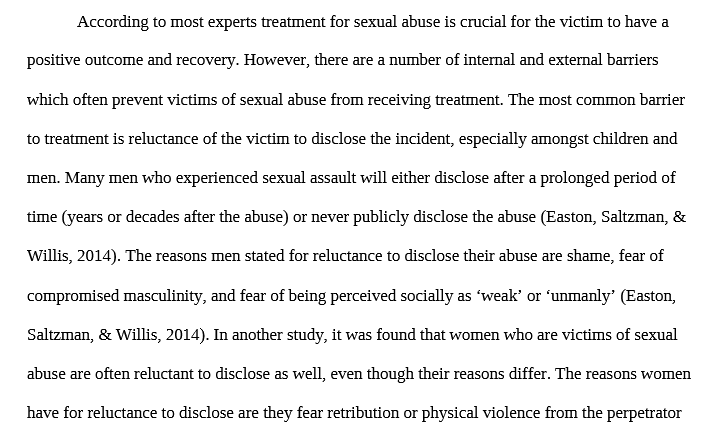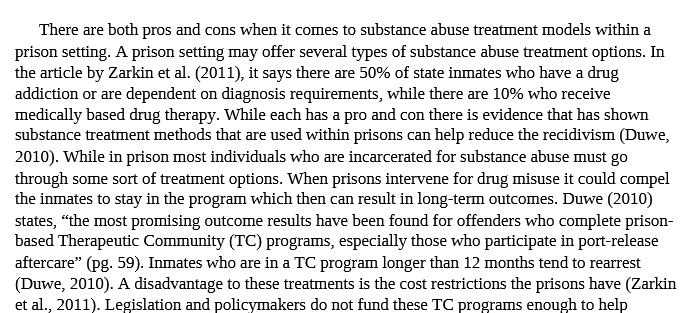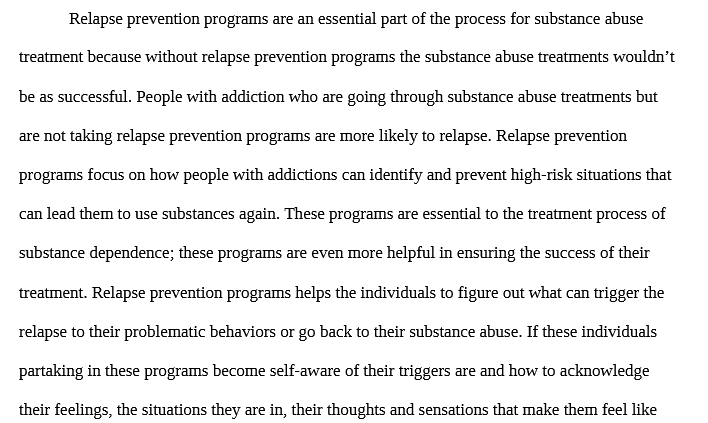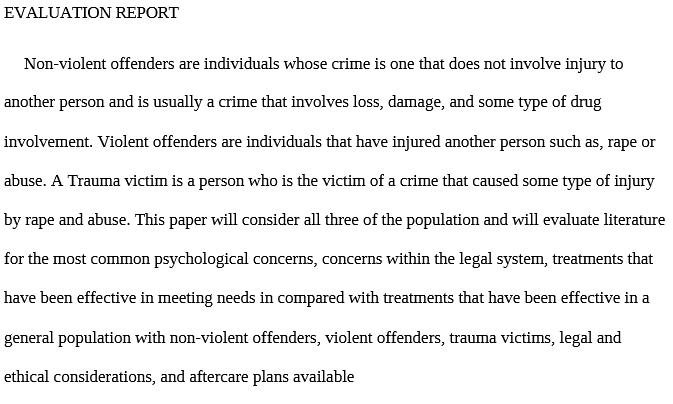PSY 624 Short paper – Sexual abuse treatment.docx- Snhu
$3.99
PSY 624 Short paper – Sexual abuse treatment.docx- Snhu
Description
PSY 624 Short paper – Sexual abuse treatment.docx- Snhu
According to most experts treatment for sexual abuse is crucial for the victim to have a positive outcome and recovery. However, there are a number of internal and external barriers which often prevent victims of sexual abuse from receiving treatment. The most common barrier to treatment is reluctance of the victim to disclose the incident, especially amongst children and men. Many men who experienced sexual assault will either disclose after a prolonged period of time (years or decades after the abuse) or never publicly disclose the abuse (Easton, Saltzman, &Willis, 2014). The reasons men stated for reluctance to disclose their abuse are shame, fear of compromised masculinity, and fear of being perceived socially as ‘weak’ or ‘unmanly’ (Easton,Saltzman, & Willis, 2014). In another study, it was found that women who are victims of sexual abuse are often reluctant to disclose as well, even though their reasons differ.
PSY 624 Short paper – Sexual abuse treatment.docx- Snhu
The reasons women have for reluctance to disclose are they fear retribution or physical violence from the perpetrator they are afraid that they will not be believed by their communities and/or the authorities they report the crime to (Jones, Alexander, Wynn, Rossman & Dunnuck, 2009). Children are often told by their abusers that if the say anything about the abuse that bad things will happen to them or their loved-ones, which causes the child to be victims too afraid to disclose. Children also often fail to disclose because of the shame, confusion, and fear associated with the abusive contact itself (Leclerc & Wortley, 2015). Future Implications Future implications for an individual who is not treated properly for sexual abuse vary depending on the age of the victim and the circumstances of the crime. Children who experience sexual abuse and do not receive treatment are twice more likely to exhibit inappropriate or aggressive sexual behavior than their peers who receive treatment (Dube, Anda, Whitfield,Brown, Felitti, Dong, & Giles, 2005) . Dube, et. al. (2005) also found that children who experience prolonged abuse and are in prolonged contact with their abusers are at high risk of committing sexual abuse themselves.
PSY 624 Short paper – Sexual abuse treatment.docx- Snhu
- PSY 211 – Lifespan Development (5015 Documents),
- PSY 215 – Abnormal Psychology (4335 Documents),
- PSY 108 – Introduction to Psychology (3759 Documents),
- PSY 223 – Statistics for Psychology Research (2652 Documents),
- PSY 216 – Psychology of Personality (1841 Documents),
- PSY 510 – Research Methods (1748 Documents),
- PSY 520 – Research Methods in Psychology II (1469 Documents),
- PSY 257 – Psychology (1451 Documents),
- PSY 310 – Criminal Psychology (1393 Documents),
- PSY 200 – FOUNDATIONS OF ADDICTIONS (1379 Documents),
Only logged in customers who have purchased this product may leave a review.







Reviews
There are no reviews yet.